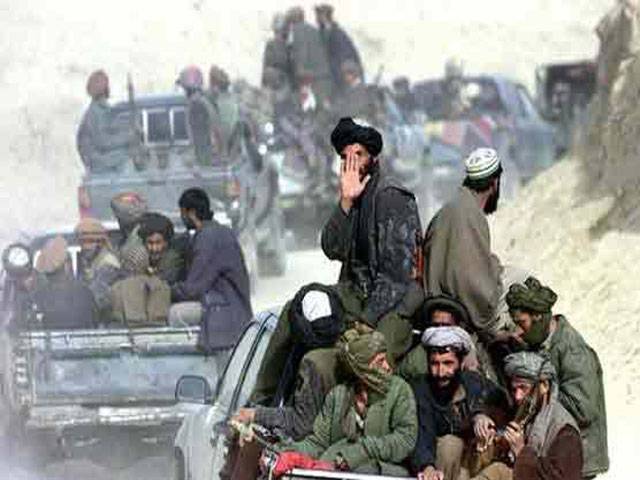Reuters - The Taliban yesterday rejected an Afghan government offer of a ceasefire and they would persist with their attacks, two militant commanders said, while insurgents ambushed three buses and nearly 200 passengers travelling for a holiday.
The two Taliban commanders said their supreme leader rejected President Ashraf Ghani’s Sunday offer of a three-month ceasefire, beginning with this week’s Eidul Azha holiday.
In June, the Taliban observed a government ceasefire over the three-day Eidul Fitr, leading to unprecedented scenes of government soldiers and militants embracing on front lines, and raising hopes for talks.
But one of the Taliban commanders said the June ceasefire had only helped US forces, who the Taliban are trying to drive out of the country, and Taliban leader Sheikh Haibatullah Akhunzada rejected the new offer on the grounds it would only help the US-led mission.
“Our leadership feels that they’ll prolong their stay in Afghanistan if we announced a ceasefire now,” a senior Taliban commander, who declined to be identified, said by telephone.
An official in Ghani’s office said the three-month-long ceasefire declared by the government was conditional, and if the Taliban did not respect it, the government would maintain military operations.
President Ghani’s offer followed an extraordinarily violent week in Afghanistan that saw the Taliban storm the provincial capital of Ghazni - just a two-hour drive from Kabul - and press the fight against security forces across the country, with estimates suggesting hundreds of people may have been killed.
It also came just hours after regional army spokesman Mohammad Hanif Rezaee said an airstrike against a Taliban convoy in the north of the country killed around 100 militant fighters.
The president said his office had cleared “all obstacles” to peace with the announcement following consultations with religious scholars, political parties and civil society groups.
The proposal was warmly welcomed by both NATO and the US, with Secretary of State Mike Pompeo calling on the Taliban to take part.
It is not yet clear if US-led NATO forces will participate in the ceasefire.
The truce offer was also welcomed by the UN Secretary-General’s Special Representative for Afghanistan Tadamichi Yamamoto, who added it was important “to seize all opportunities for a negotiated end to the conflict”.
The Taliban did not immediately respond to Ghani’s proposal, but vowed to release “hundreds” of “enemy prisoners” to mark the Eidul Azha.
The president’s spokesman slammed reports the Taliban may reduce fighting without formally declaring a truce. “Any unofficial ceasefire or restraint in some parts of the country is not a ceasefire. If they announce it officially, we will hold it as long as they continue,” Haroon Chakhansuri told reporters, adding that military operations were continuing in several provinces in the absence of a deal.
Analysts were mixed over the proposal, with some saying the government’s move was a sign of desperation after recent heavy bloodshed, while others said the trust-building measure was integral to paving the way for negotiations.
“After Ghazni City and everything else, this looks really desperate,” tweeted Bill Roggio, a senior fellow at the Foundation for Defense of Democracies.
Kabul-based military analyst Ateequllah Amarkhail however said the war had ground to a stalemate, and the Taliban needed to respond positively to open dialogue.
As anticipation mounted over a Taliban response, interior ministry spokesman Najib Danish confirmed that some 140 people had been briefly kidnapped then set free in Kunduz early Monday.
He added that authorities did not know who was behind the abductions, which are common in the province. Local officials also could not confirm the culprits. Some media outlets reported that the Taliban may have been involved.
Prior to Ghazni there had been tentative signs that diplomatic efforts to initiate peace negotiations were starting to bear fruit.
In June Washington indicated a shift in its longstanding policy that negotiations must be Afghan-led.
Last month Taliban representatives met US officials for talks in Qatar, militant sources have told AFP.
Afghan security forces have suffered enormous losses since US-led NATO combat forces withdrew in late 2014.
But it is ordinary Afghans who been suffered the most in the relentless conflict, especially in Kabul, which the UN has said is the deadliest place for civilians in Afghanistan.
Meanwhile, Russia on Monday said it was preparing international peace talks on Afghanistan on September 4 and has invited the Taliban, the day after Afghan President Ashraf Ghani declared a new 3-month ceasefire.
“We are preparing it for September 4,” Zamir Kabulov, special representative of the Russian president on Afghanistan, said in an Interfax news agency report.
Asked whether the Taliban were invited to the meeting in Moscow, Kabulov said they were and that the talks were “in the framework of launching a process of national reconciliation in Afghanistan.”
He said Moscow views “positively” the truce offer extended by Ghani Sunday, which followed a bloody week of fighting across Afghanistan, including a Taliban assault against the important provincial capital Ghazni.
Russia “hopes that the Taliban will react positively” to the offer, Kabulov said.
In April 2017, Moscow hosted an international conference on Afghanistan with representatives from Afghanistan, India, Iran, China, Pakistan, and five former Soviet republics in Central Asia. The US was invited to that meeting but did not participate.
Russia and its allies called on the Taliban to lay down weapons and negotiate with the Afghan government directly. Moscow also declared its readiness to serve as a platform for dialogue following 17 years of conflict.






